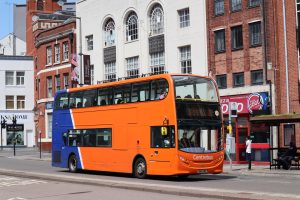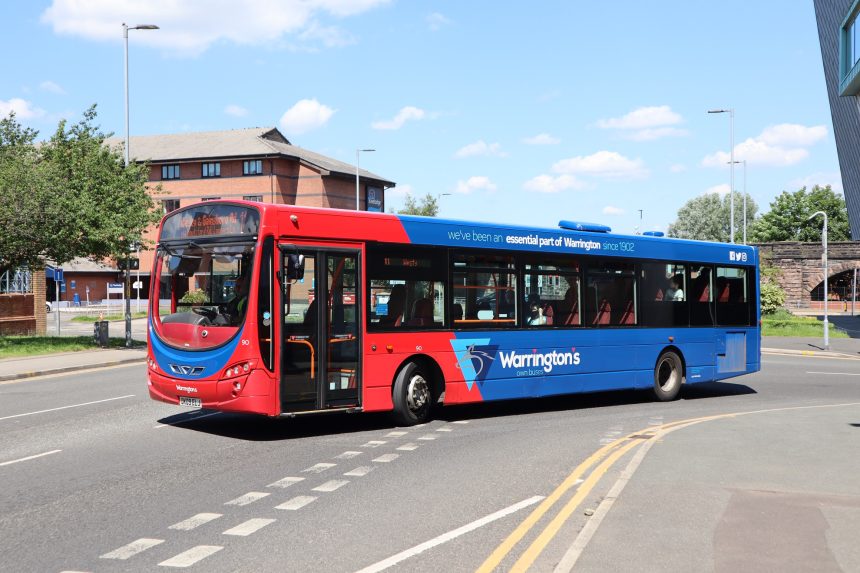The first £150 million of the £1 billion diverted from HS2 to buses in England has been indicatively allocated to Bus Service Improvement Plan (BSIP) work in the North and Midlands during FY2024/25.
Every local transport authority (LTA) in those areas gains such funding. The Confederation of Passenger Transport (CPT) has queried why only £150 million is allocated, although the Department for Transport (DfT) has confirmed that the full £1 billion will go to buses in the North and Midlands, with further allocations to follow.
To receive the highest allocation for FY2024/25 is the West Midlands Combined Authority, at £16,604,000. The lowest amount will go to Rutland County Council, with £233,000.
Extension of the capped £2 fare via the Bus Fare Cap Grant scheme until the end of 2024 will also be funded from money redirected from the cancellation of HS2 north of the West Midlands. That has already drawn a mixed response from operators involved.
Former HS2 money for bus only for service improvements?
In announcing initial allocations, DfT says that they are to improve services. Such wording suggests that LTAs will not be able to put them towards supporting existing provision. That task is in theory covered by previously-announced BSIP Plus and BSOG Plus streams, along with a revision to policy around earlier BSIP money that enabled its use for that purpose.
Instead, the Department adds that the money for FY2024/25 is “enough to support up to 25 million miles of new bus services… helping LTAs to provide more regular and reliable services, or cheaper fares delivered through fare initiatives and ticket price caps.”

Ringfencing the money solely for the North and Midlands is part of the government’s claimed levelling up agenda, DfT says.
It suggests that funds could be used to reintroduce evening services, improve frequencies, add new routes, or facilitate demand responsive transport.
Prime Minister Rishi Sunak says: “Today’s announcement marks the start of the Network North plan coming into action.
“We are backing buses with one of the biggest ever support packages, and keeping bus fares down to ensure that the country’s favourite means of transport of more affordable for millions of people.
“This government is taking the right long-term decisions to deliver on our vision for a fairer and improved transport system by investing billions back into the projects that matter most to people and their communities.”
Longer horizon needed for improvements, CPT says
Responding to the BSIP allocations, CPT Chief Executive Graham Vidler acknowledges that the £1 billion is to be spent over five years. However, he adds that there needs to be “clear direction” from the government on how all of that money will be distributed.
“Today’s announcement confirms how just under a fifth will be allocated. This is not enough clarity for bus operators and LTAs to confidently plan longer-term bus investment, while continuing to deliver good services for passengers.”
In a separate and unexpected move, BSOG payments to community transport organisations that operate services under Section 19 permits will increase by 60%, backdated to 1 July and running to 31 March 2025. That will see the rate move from 35p per litre of diesel to 56ppl.
Such an uplift is applicable only to those operators and has been welcomed by the Community Transport Association.
It comes against a backdrop of long-promised reform of BSOG in England having not yet happened, despite Under-Secretary of State for Transport Baroness Vere telling the Transport Committee on 29 June 2022 that proposals would be forthcoming before last year was out.
Likely areas of focus for that overhaul were first outlined in the National Bus Strategy for England, published over two-and-a-half years ago in March 2021.
Allocations of the BSIP funding for FY2024/25 are as follows:
Blackburn with Darwen Borough Council: £880,000
Blackpool Council: £802,000
Cheshire East Council: £2,268,000
Cheshire West and Chester Council: £2,031,000
City of York Council: £1,153,000
Cumberland Council: £1,554,000
Derby City Council: £1,486,000
Derbyshire County Council: £4,519,000
East Riding of Yorkshire Council: £1,946,000
Greater Manchester Combined Authority: £16,309,000
Herefordshire Council: £1,064,000
Hull City Council: £1,519,000
Lancashire County Council: £7,025,000
Leicester City Council: £2,096,000
Leicestershire County Council: £4,051,000
Lincolnshire County Council: £4,370,000
Liverpool City Region Combined Authority: £8,825,000
North East Combined Authority and North of Tyne Combined Authority: £11,202,000
North East Lincolnshire Council: £893,000
North Lincolnshire Council: £965,000
North Northamptonshire Council: £2,045,000
North Yorkshire Council: £3,500,000
Nottingham City Council: £1,840,000
Nottinghamshire County Council: £4,691,000
Rutland County Council: £233,000
Shropshire Council: £1,840,000
South Yorkshire Mayoral Combined Authority: £7,820,000
Staffordshire County Council: £4,982,000
Stoke-on-Trent City Council: £1,469,000
Tees Valley Combined Authority: £3,851,000
Telford and Wrekin Council: £1,055,000
Warrington Borough Council: £1,200,000
Warwickshire County Council: £3,394,000
Westmorland and Furness Council: £1,289,000
West Midlands Combined Authority: £16,604,000
West Northamptonshire Council: £2,421,000
West Yorkshire Combined Authority: £13,373,000
Worcestershire County Council: £3,433,000.
DfT notes that where further Combined Authorities (CAs) commence operation, future funding will be allocated to those.




























